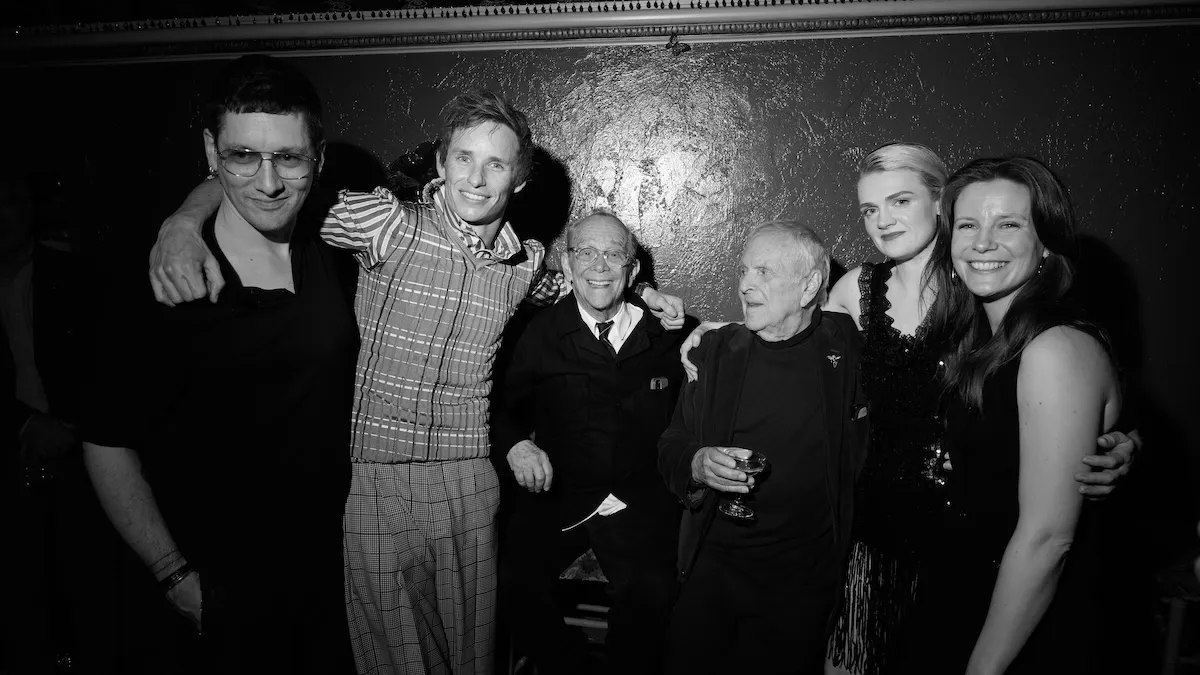Cabaret has been one of my favorite shows for decades. Evocative, thought-provoking, and a message to those ignoring the pain of the world, the show has a new life in the Broadway revival starring Eddie Redmayne and Gayle Rankin. And it is more important than ever.
Directed by Rebecca Frecknall, the new production doesn’t give just the Emcee the weight to carry with the show. Sally Bowles plays a more important part. Frecknall used the source material to help guide her in that decision. “I think for me, I always start with the source material,” she said. “I don’t go in with an idea of something that I’m trying to put on top of that. It’s always about really spending time with the source material and seeing how I feel that resonates with me and with the contemporary society. And then seeing what ideas I suppose come to draw that out. So anything that feels conceptual in the work is something that’s come out of the text or out of the music rather than something I’m trying to put on top of it.”
The source material is, of course, a John Kander and Fred Ebb musical with a book by Joe Masteroff, based on a novel by Christopher Isherwood. “It’s one of my favorite musicals as well and I grew up on it and I have a great love of the source material and that’s the reason I wanted to do it,” Frecknall said. “And it’s just interesting when you start looking at the text and looking at the idea of the Emcee as a main character I think maybe is like, you can question that because actually on the page he’s almost like a framing device. What I found with so many of the characters that if you do, particularly on the Emcee and Sally Bowles, actually, if you do a sort of naturalism exercise, when you look through the text and write down any facts that come up about the characters, there just aren’t any.”
That does come down to the creative process of whoever is staging the production, at least according to what Kander said to Frecknall. “They are kind of built to be open for interpretation. And when I spoke with John Kander about the piece, because I was in conversation with him as we made it for London, and then again coming to New York, he just said to me that he felt that the material was so robust, it can take really bold ideas and it can take interpretation and he’s really fascinated by that. So I always felt like we were in conversation with the material and everything’s come out of that. Every decision we’ve made has come out of the structure of the piece and the world of the characters and the music and the rhythm and the dramaturgy. So everything is about unlocking that for a contemporary audience from my point of view.”
The timeliness of Cabaret
One of my favorite aspects of this story is that it is shouting at the audience. Set on the eve of World War II, the musical makes it very clear that ignoring the issues of the world to live in your own bliss will only last so long before they are knocking at your door. This production of Cabaret comes at a time when it has gotten even more timely given the current war.
But what works with this production is that it doesn’t need to change much to make that shout loud enough for the audience to hear. “I think whenever you perform a piece of work, it will resonate with the time it’s being, or it should resonate with the time it’s being performed in,” Frecknall said. “And the interesting thing with Cabaret is, as you say, we made it about three years ago in London, and it felt so timely then, and then we’ve recast it so many times and every time we recast it, it feels more timely again. And then bringing it to New York, it suddenly felt so much more timely. And I think that’s to do with the test. There’s a testament to the urgency and the vitality of the piece of writing because, and again, when I was talking to John Kander about it, he said to me that when they first wrote the piece, they had no idea it was going to continue to be performed and continue to be so relevant and to resonate so much with contemporary audiences and contemporary politics.”
Which Frecknall explains is something that is both heartbreaking and raw about Cabaret. “And he said whilst it’s so thrilling to always have or to have experienced so many new revivals, it’s also kind of sad how resonant it keeps on being because I suppose that their hope was it wouldn’t continue to be so. It’s really interesting what things, I suppose the things you hear in the piece so much more vividly when it’s being performed now and in New York. And then also the opportunity to return to a piece of work and to improve it and to harness it and polish it and make changes where we wanted to, we really approached it even though in some ways it’s a transfer of a production that exists. It’s also not, it’s also more like a kind of evolution of the piece we made before. And there are new things in the work that we found through the building that it’s in through the time it’s being performed through the people who are performing it. And so it always evolves every time we come back to it. And the New York production is definitely an evolution of what we made in London.”
Cabaret is currently open on Broadway.
(featured image: Jenny Anderson)









